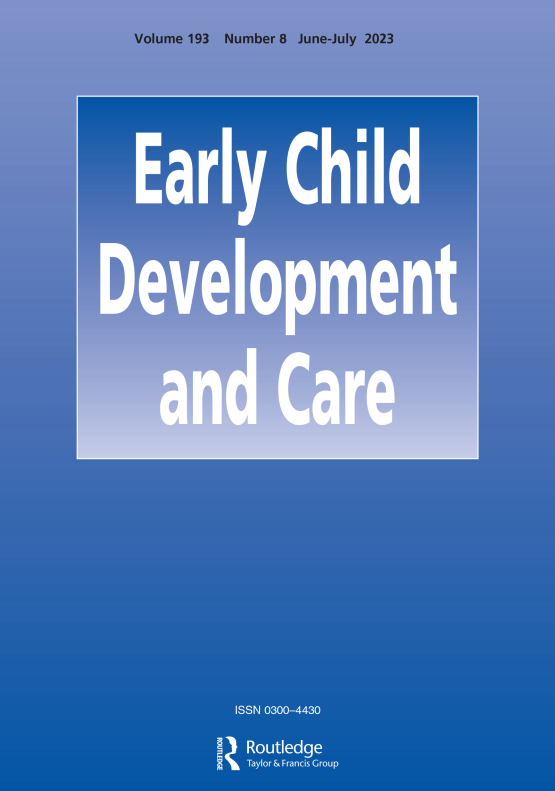Submit a Manuscript to the Journal
Early Child Development and Care
For a Special Issue on
Advancing Equity In Early Childhood Social And Emotional Learning
Manuscript deadline

Special Issue Editor(s)
Claire Blewitt,
Monash University, Australia
claire.blewitt@monash.edu
Marissa Yi-Hsuan Wu,
National Taiwan Normal University, Taiwan
marissayhwu@ntnu.edu.tw
Advancing Equity In Early Childhood Social And Emotional Learning
Social and Emotional Learning (SEL) in early childhood and school settings is widely recognised as an effective approach for strengthening children’s social, emotional and learning outcomes. Evidence shows that well-designed and implemented SEL programs can prevent emotional and behavioural challenges, with potential to promote more equitable health and educational outcomes. Research in early childhood and primary settings has largely focused on evaluations of universal SEL programs delivered to all children in a group or classroom, regardless of risk. Notwithstanding the important knowledge this generates, it can hide the individual differences in how, why and for whom SEL programs work to support children’s developmental outcomes. Factors such as gender, race and ethnicity, exposure to adversity or trauma, risk of mental health challenges, first language, socioeconomic disparities, gender diversity and disability can influence how children experience and express their emotions, understand others and engage in social relationships. These factors also contribute to the wide variability in social-emotional development across child populations. Despite a substantial and growing evidence base, relatively little is known about whether SEL programs are reaching and benefiting the children most at risk of social and emotional challenges, or whether they are contributing to more equitable developmental outcomes. This poses an equity issue that cannot be ignored.
More research is needed to explore how SEL programs are designed for equity, and the extent to which their content, delivery, and measurement approaches reflect the diverse lived experiences of children. Scholars and practitioners are increasingly questioning whether current SEL programs, frameworks, and measures, many of which reflect Western social norms and assumptions about how social and emotional skills should develop and be expressed, are suited to support the well-being of all children, particularly those of colour and those from First Nations and multicultural communities facing systemic disadvantage. Understanding how children’s identities and developmental trajectories interact with SEL content, pedagogies, and broader ecological systems including caregiving relationships, cultural practices, policy settings and institutional structures that shape opportunities for children’s equitable learning and wellbeing, is a complex but vital challenge for the field.
This special issue aims to advance knowledge on equity in SEL as both a process and an outcome, with a focus on early childhood and early primary settings (birth to 8 years). We invite contributions that critically examine equity in SEL and children’s social-emotional development, and encourage a range of methodological approaches, including quantitative, qualitative, mixed-methods, conceptual, and high-quality systematic reviews. All studies must include child SEL data and outcomes and/or theories of child SEL development to align with the journal aim and vision. Papers focused only on teacher/teaching and/or parents/parenting without an explicit focus on early child development outcomes will not be considered for this special issue. Potential topics include:
- Understanding what works for who and why in SEL: To what extent are SEL efforts reaching and benefiting children most in need of support? What mechanisms of change underpin SEL across diverse child populations, and how might relational, family, or community contexts shape these pathways?
- SEL and equity in child development outcomes: To what extent has an explicit focus on equity in SEL programs improved developmental outcomes for children? What patterns or characteristics are evident in these outcomes (e.g., faster improvements, greater magnitude of change, or reduced disparities)? To what extent do factors such as caregiving relationships, cultural expectations, or family and community influences relate to or interact with equitable SEL outcomes for young children?
- Addressing equity in SEL program design, implementation and evaluation: How have diverse voices and perspectives been heard and considered in SEL program co-design, implementation and evaluation to improve SEL outcomes for children? How have First Nations, trauma-informed, culturally responsive and other equity-informed principles and theories been centred in SEL content and delivery to improve SEL outcomes for children?
- Equity in measurement: To what extent are existing SEL measures and tools valid and meaningful for children, families and educators from diverse cultural, linguistic, and social backgrounds?
- Equity in educator learning and practice: What roles do educator knowledge, beliefs, self-efficacy, emotional wellbeing, or other attributes play in the equitable implementation and child outcomes of SEL programs?

